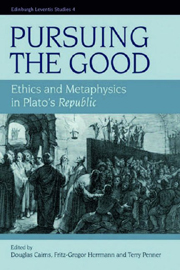Book contents
- Frontmatter
- Contents
- Preface
- Contributors and Editors
- Introduction
- 1 What is the Form of the Good the Form of? A Question about the Plot of the Republic
- 2 Glaucon's Challenge, Rational Egoism and Ordinary Morality
- 3 Thrasymachean Rulers, Altruistic Rulers and Socratic Rulers
- 4 Neutralism in Book I of the Republic
- 5 The Good, Advantage, Happiness and the Form of the Good: How Continuous with Socratic Ethics is Platonic Ethics?
- 6 The Form of the Good and the Good in Plato's Republic
- 7 Flourishing: The Central Concept of Practical Thought
- 8 Is Plato's Conception of the Form of the Good Contradictory?
- 9 The Good, Essences and Relations
- 10 The Idea of the Good and the Other Forms in Plato's Republic
- 11 The Aporia in the Charmides about Reflexive Knowledge and the Contribution to its Solution in the Sun Analogy of the Republic
- 12 The Good and Mathematics
- 13 The Good and Order: Does the Republic Display an Analogy Between a Science of Ethics and Mathematics?
- 14 Inquiry and Justification in the Search for the Highest Good in Plato and Aristotle
- 15 The Carpenter and the Good
- 16 Conversion or Conversation? A Note on Plato's Philosophical Methods
- Index
10 - The Idea of the Good and the Other Forms in Plato's Republic
Published online by Cambridge University Press: 12 September 2012
- Frontmatter
- Contents
- Preface
- Contributors and Editors
- Introduction
- 1 What is the Form of the Good the Form of? A Question about the Plot of the Republic
- 2 Glaucon's Challenge, Rational Egoism and Ordinary Morality
- 3 Thrasymachean Rulers, Altruistic Rulers and Socratic Rulers
- 4 Neutralism in Book I of the Republic
- 5 The Good, Advantage, Happiness and the Form of the Good: How Continuous with Socratic Ethics is Platonic Ethics?
- 6 The Form of the Good and the Good in Plato's Republic
- 7 Flourishing: The Central Concept of Practical Thought
- 8 Is Plato's Conception of the Form of the Good Contradictory?
- 9 The Good, Essences and Relations
- 10 The Idea of the Good and the Other Forms in Plato's Republic
- 11 The Aporia in the Charmides about Reflexive Knowledge and the Contribution to its Solution in the Sun Analogy of the Republic
- 12 The Good and Mathematics
- 13 The Good and Order: Does the Republic Display an Analogy Between a Science of Ethics and Mathematics?
- 14 Inquiry and Justification in the Search for the Highest Good in Plato and Aristotle
- 15 The Carpenter and the Good
- 16 Conversion or Conversation? A Note on Plato's Philosophical Methods
- Index
Summary
In one respect at least, the Republic holds a special place in the development of Plato's ontology: in the Republic, Plato lets Socrates talk about forms apodictically. There is neither the tentative searching and allusive adumbration of the earliest dialogues, some of which end in aporia; nor the reasoned demonstration and laboured introduction that can be seen in the Meno, Euthyphro and, most of all, the Phaedo; there is no need for divine or daimonic revelation, as in the Symposium through the mouth of the priestess Diotima; nor yet is there any explicit questioning or criticism of the notion of forms as such, as in the Parmenides. In one respect, the Republic is thus marked by the confidence which underlies all the caution and all the provisos with which Socrates is made to build up the tension on the way to the eventual unveiling of the greatest thing that can be learned, the idea of the good. This confidence is reflected not least in the way Plato uses the philosophical terminology which he had developed from the Gorgias onwards. In this chapter, an attempt is made to distinguish the way in which Plato in the Republic talks about the good itself from the way in which he talks about the just, the temperate, the brave, etc. I shall suggest that the obvious respect in which the idea of the good differs from the other forms points not so much to a revision of views expressed about the forms earlier, for example in the Phaedo, as to an explication in light of which the Phaedo and other earlier dialogues should be re-read.
- Type
- Chapter
- Information
- Pursuing the GoodEthics and Metaphysics in Plato's Republic, pp. 202 - 230Publisher: Edinburgh University PressPrint publication year: 2007



